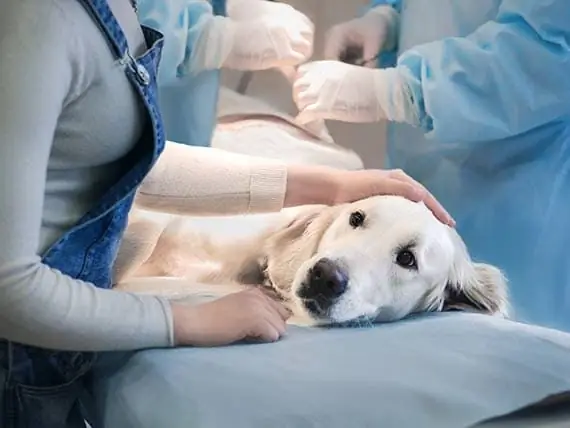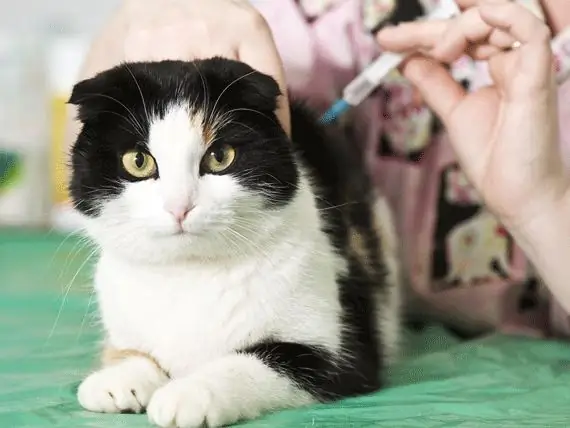
- Auteur Daisy Haig haig@petsoundness.com.
- Public 2023-12-17 03:12.
- Laatst gewijzigd 2025-01-24 12:40.
Wanneer u een puppy koopt, koopt u een "gezondheidscertificaat" dat bij haar hoort. Zoals elke letterlijke consument ga je ervan uit dat een certificaat met deze titel betekent dat ze is onderzocht door een dierenarts en een goedkeuringsstempel heeft gekregen van de gezondheidsafdeling.
Raad nogmaals.
Vorige week heb ik een stortvloed aan e-mails ontvangen van mijn FVMA (Florida Veterinary Medical Association) lijstservice. Het onderwerp was de wijdverbreide professionele verwarring over OCVI's (officieel certificaat van veterinaire inspectie voor intrastatelijke verkoop van een hond of kat). De OCVI, een formulier met de algemene naam 'gezondheidscertificaat', is een van die documenten waarvan de meeste staten eisen dat ze worden ingevuld door een erkende dierenarts voordat een dier kan worden verkocht of vervoerd over staatsgrenzen.
the point of this document? to ensure animals are vaccinated and free of parasites or other infectious diseases before sale, not (contrary to popular opinion, including mine before last week) to certify the animal’s complete health.
(at least that’s how it stands in the great state of florida, given the confusion that reigns over what these documents actually mean and how ocvis are to be filled out.)
i wasn’t sure i believed this. after all, it has always seemed to me that the purpose of this form was to ensure that unscrupulous breeders and pet shops couldn’t pass on clearly defective “merchandise.” even if you could care less about animal health and welfare, it makes sense that a health certificate should certify health at the time the animal is examined-in the interest of consumer protection, at the very least.
the emails on this thread proved otherwise. indeed, several veterinarians spoke out against the ocvi as a proof of health, referencing the need to avoid legal liability in the event that a purchased pet prove chronically ill or congenitally flawed.
silly me, i thought that was the point. since we get paid to sign these documents i figured the financial remuneration was in exchange for our expertise-that is, beyond pushing a few shots, checking for kennel cough and expertly scooping stool from a rectum for analysis.
wrong!
confused, i researched this issue. and here’s what i found:
apparently, the problem of “health certification” and veterinarian resistance to the issue stems from a drive to make vets liable for congenital illnesses that manifest up to a year after purchase when they sign ocvis.
example: a pup that was normal when a vet examined him at 8 weeks. six months later he’s diagnosed with hip dysplasia. and guess what? according to this proposed interpretation of ocvis the vet is potentially liable for his treatment.
given the choice between a document that makes me liable for what i can attest to and one that requires a crystal ball for the kind of accuracy i’m willing to sign my name to, i guess i’ll elect the former any day of the week. can’t blame my fvma colleagues on that score.
but why the either/or? why can’t i simply be liable for all the problems any reasonable vet should have seen at the time the exam?
honking heart murmurs, undescended testicles, certain obvious knee and hip diseases…
don’t these congenital niceties deserve to be included among the “health” issues we need to vet as vets?
i see pet shop pups and other shipped pets with two day-old ocvis bearing obvious congenital illnesses any third-year vet student could diagnose. clearly that’s wrong. someone needs to be accountable when these conditions are given a pass. but legally, all’s fair and square if a health certificate only deals in infectious diseases. after all, most states also have pet lemon laws making it “easy” to return a defective afflicted animal within a certain period of time. no harm no foul, right?
wrong again. no animal should be sold without a veterinarian’s stamp of approval within ten days of the sale. and that should mean that the animal appears to be completely healthy at the time of the exam. any congenital abnormalities should be written on the form. anything less means no sale. no way.
responsible breeders wouldn’t dream of doing otherwise. pet shops, on the other hand, exploit all the angles. they work with vets who know the loopholes as well as they do. they even try to get prospective owners to sign lemon law waivers, passing them off easily in the pile of paperwork that attends the point of sale.
as it stands, what you consider a health certificate for that puppy in the window may mean nothing except that said pup was vaccinated, no upper respiratory symptoms were noted and that no parasites were observed on the day the pup was presented to the vet for examination. but if vets are liable for only those meager, easily refutable functions, what does that say about the entire “health certification” process?
as my former ignorance of the law clearly implies, not all vets even know what they’re signing when they complete these forms. but you can bet the ones who work for the pet shops do.
check your state’s regulations to determine what your health certificates mean. even if you’ll never purchase a pet in your lifetime, your moral compass should drive you to care about what happens to thousands of animals every day in your state/province/country.
no-health health certificates? they simply ensure that poor quality purveyors of congenitally flawed animal flesh can continue to breed animals irresponsibly, unfairly and cruelly. and that’s gotta change.
Aanbevolen:
Een Dierenarts Vertelt Over De Beste Ingrediënten Voor Gewrichtssupplementen Voor Honden

Ontdek wat een dierenarts te zeggen heeft over waar u op moet letten bij gewrichtssupplementen voor honden en hoe u de beste gewrichtssupplementen voor honden kunt kiezen
Het Belang Van Enscenering Voor Huisdieren Met Kanker, Deel 1 - Wat Is Kankerstadiëring Voor Huisdieren?

Wanneer bezorgdheid over kanker ontstaat, moeten dierenartsen een benadering van het hele lichaam volgen bij het stellen van de diagnose van de patiënt en het opstellen van een behandelplan. Dit proces wordt enscenering genoemd. Hier zijn enkele van de technieken die worden gebruikt bij het organiseren van een huisdier voor kanker. Lees verder
Wat Bloedonderzoek Uw Dierenarts Vertelt Over De Gezondheid Van Uw Huisdier?

Er wordt bloedonderzoek gedaan om ervoor te zorgen dat we van binnen net zo gezond zijn als van buiten, of om eerder gediagnosticeerde medische aandoeningen te controleren. Hetzelfde geldt voor gezelschapsdieren. Lees meer over wat bloedonderzoek uw dierenarts kan vertellen
Reizende Huisdieren Hebben Vaak Gezondheidscertificaten Nodig

Wist u dat als u met uw huisdier een staatsgrens overschrijdt, u geacht wordt een geldig certificaat van veterinaire keuring bij u te hebben? Het is waar. Denk terug aan de laatste keer dat je tante Mable in Ohio bezocht of een wandeling maakte in Virginia. Je overtrad de wet als je Fluffy of Fido meebracht zonder gezondheidscertificaat
Bezorgdheid Over Terugroepacties Voor Huisdieren En Veiligheid Van Het Grootste Belang Voor Eigenaren, Blijkt Uit Onderzoek Van PetMD

Een recente petMD-enquête toonde aan dat eigenaren van gezelschapsdieren zich niet alleen zorgen maken over voedselbesmetting, maar ook over wat bedrijven kunnen doen om dit te voorkomen
